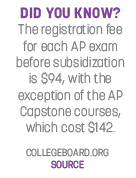Every spring, our school’s gyms, theaters and classrooms are lined wall-to-wall with beige and gray desks. Students stand in queues holding their student IDs, pencil cases and water bottles in hand to spend their morning or afternoon inside those rooms taking standardized exams. I have been in those lines now for my fourth year. Our school offers AP and IB exams which are meant to give students an opportunity to obtain college credit for their high school coursework, established by the College Board and International Baccalaureate Organization.
 Among those exams, some are subsidized; some are not. In simpler terms, subsidization is financial coverage for exam fees. Despite cuts to federal funding, the Indiana Department of Education 2017 guidelines state that it provides subsidies for AP English, Science and Math exams. On the other hand, Indiana does not have any federal or state funding allocated for IB exams. The Education Commission of the States has a nationwide comparison for IB state programs and teacher funding. Out of all 50 states and Puerto Rico, only seven states have definite funding for IB exams.
Among those exams, some are subsidized; some are not. In simpler terms, subsidization is financial coverage for exam fees. Despite cuts to federal funding, the Indiana Department of Education 2017 guidelines state that it provides subsidies for AP English, Science and Math exams. On the other hand, Indiana does not have any federal or state funding allocated for IB exams. The Education Commission of the States has a nationwide comparison for IB state programs and teacher funding. Out of all 50 states and Puerto Rico, only seven states have definite funding for IB exams.
As a public school falling under state and federal policies, our school does not have any control over which exams to subsidize and which to not. Taking this into account, I am appealing to the federal government—the one that cut funding towards exam subsidization—that does have control. The amount of exam fees I, and my peers, pay can cause significant financial burden. For example, this year, people taking all six IB exams have paid $1,000 alone. If they also take any History, Music or World Language AP exams, which are not subsidized, it would only pile onto the cost.
However, there is an exception for students who receive Free and Reduced lunch. The Indiana Youth Institute’s data shows that 47.1 percent of Indiana public school students are a part of this program. In contrast, Carmel’s socioeconomic demographic does not wholly represent this percentage. Mayor Jim Brainard says on our city website that we have “large cash reserves and reasonable debt levels.” So, most students at our school taking these standardized exams do not receive significant financial aid in paying for them.
Hopefully, the U.S. Department of Education will allocate funding so states like Indiana can provide their students with higher education credit beyond AP English, Math and Science. While these are useful and crucial, it would be incredible to see growth in other subjects and types of standardized tests, as long as we live in an education system that functions on the existence of these tests.
The views in this column do not necessarily reflect the views of the HiLite staff. Reach Lin-Lin Mo at [email protected].




























![Keep the New Gloves: Fighter Safety Is Non-Negotiable [opinion]](https://hilite.org/wp-content/uploads/2024/12/ufcglovescolumncover-1200x471.png)















































![Review: “Family By Choice” is the perfect watch that encapsulates family, love and everything in between [MUSE]](https://hilite.org/wp-content/uploads/2024/12/family-by-choice-1.png)
![Review: “A Phở Love Story” is an exceptional and authentic representation of teenage Vietnamese-Americans [MUSE]](https://hilite.org/wp-content/uploads/2024/12/a-pho-love-story-9781534441941_hr-786x1200.jpg)
![Review: “And the War Came” by Shakey Graves is the perfect year-round album [MUSE]](https://hilite.org/wp-content/uploads/2024/12/IMG_2665.jpeg)
![Review: "Abbott Elementary", a show I can watch with my family and truly enjoy [MUSE]](https://hilite.org/wp-content/uploads/2024/12/unnamed-1.png)
![Review: “We Live in Time” leaves you wanting more [MUSE]](https://hilite.org/wp-content/uploads/2024/12/IMG_6358.jpg)
![Review in Print: Maripaz Villar brings a delightfully unique style to the world of WEBTOON [MUSE]](https://hilite.org/wp-content/uploads/2023/12/maripazcover-1200x960.jpg)
![Review: “The Sword of Kaigen” is a masterpiece [MUSE]](https://hilite.org/wp-content/uploads/2023/11/Screenshot-2023-11-26-201051.png)
![Review: Gateron Oil Kings, great linear switches, okay price [MUSE]](https://hilite.org/wp-content/uploads/2023/11/Screenshot-2023-11-26-200553.png)
![Review: “A Haunting in Venice” is a significant improvement from other Agatha Christie adaptations [MUSE]](https://hilite.org/wp-content/uploads/2023/11/e7ee2938a6d422669771bce6d8088521.jpg)
![Review: A Thanksgiving story from elementary school, still just as interesting [MUSE]](https://hilite.org/wp-content/uploads/2023/11/Screenshot-2023-11-26-195514-987x1200.png)
![Review: "When I Fly Towards You", cute, uplifting youth drama [MUSE]](https://hilite.org/wp-content/uploads/2023/09/When-I-Fly-Towards-You-Chinese-drama.png)
![Postcards from Muse: Hawaii Travel Diary [MUSE]](https://hilite.org/wp-content/uploads/2023/09/My-project-1-1200x1200.jpg)
![Review: "Ladybug & Cat Noir: The Movie," departure from original show [MUSE]](https://hilite.org/wp-content/uploads/2023/09/Ladybug__Cat_Noir_-_The_Movie_poster.jpg)
![Review in Print: "Hidden Love" is the cute, uplifting drama everyone needs [MUSE]](https://hilite.org/wp-content/uploads/2023/09/hiddenlovecover-e1693597208225-1030x1200.png)
![Review in Print: "Heartstopper" is the heartwarming queer romance we all need [MUSE]](https://hilite.org/wp-content/uploads/2023/08/museheartstoppercover-1200x654.png)




